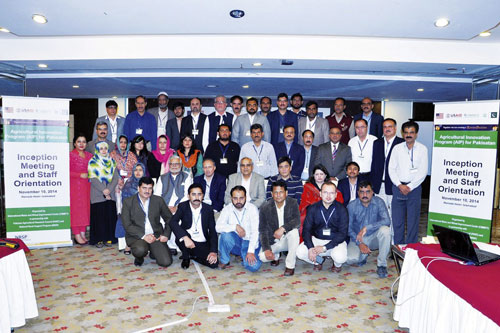CIMMYT entered an important new partnership with Pakistan’s National Rural Support Program (NRSP) on 7 November 2014 for wheat varietal evaluation, promotion and deployment, as well as on-farm agronomic interventions and community-based seed production enterprises.
A not-for-profit development organization established in 1991 that fosters a countrywide network of more than 200,000 grassroots organizations across 56 districts, NRSP enables rural communities to plan, implement and manage development programs for employment, poverty alleviation and improved quality of life. Through direct linkages with some 400,000 smallholder farming families, the organization will help extend the reach of the CIMMYT- led Agricultural Innovation Program for Pakistan (AIP), according to Dr. Rashid Bajwa, chief executive officer of NRSP. “We can now jointly scale out to a vast number of smallholders with average daily earnings of less than two dollars a day,” Bajwa said, mentioning the organization’s activities like microfinance enterprise development.

Aiming to benefit the disadvantaged
The partnership paves the way for a new and different kind of innovation platform focusing on smallholders, tenants and the landless, female-headed households and vulnerable groups such as flood victims, said Muhammad Imtiaz, CIMMYT liaison officer for Pakistan and AIP Chief of Party: “This will contribute directly to the Center’s mission of improving the food security and resilience of those most at risk, not to mention opening avenues for other AIP partners to join hands in testing and promoting appropriate agricultural innovations.”
Taking advantage of NRSP’s gender-responsive approach, the partnership will work directly with and seek to empower women farmers, identifying wheat varieties and technologies that help increase their food security and incomes. Work will identify, test and deploy high-yielding and rust resistant wheat varieties across 23 districts and include improved farming practices for diverse settings from rain-fed to fully-irrigated.
A major focus will be to develop community-based seed enterprises linked with NRSP, small seed companies, farmer associations and seed regulatory bodies, serving remote villages that have heretofore lacked access to improved varieties.
“This will contribute directly to the Center’s mission of improving the food security and resilience of those most at risk” –Muhammad Imtiaz CIMMYT liaison officer for Pakistan and AIP Chief of Party

Getting Off on the Right Foot
A partnership inception meeting and staff training for NRSP were organized on 10 November in Islamabad, with 32 participants from NRSP and 11 from CIMMYT, including senior management from both the organizations, and with Malik Fateh Khan, NRSP Regional Manager, providing a welcome address.
Imtiaz Hussain, CIMMYT cropping systems agronomist, highlighted conservation agriculture technologies and their relevance for the partnership. Krishna Dev Joshi, CIMMYT wheat improvement specialist, discussed various types of varietal testing, including participatory varietal selection, mother-baby trials and on-farm demonstrations, to creating awareness and demand for improved seed among farmers. Three CIMMYT colleagues who also spoke at the event were: Shamim Akhter, AIP project manager; Amina Nasim Khan, communications specialist; and Ghazi Kamal, monitoring and evaluation specialist.
 Capacity development
Capacity development